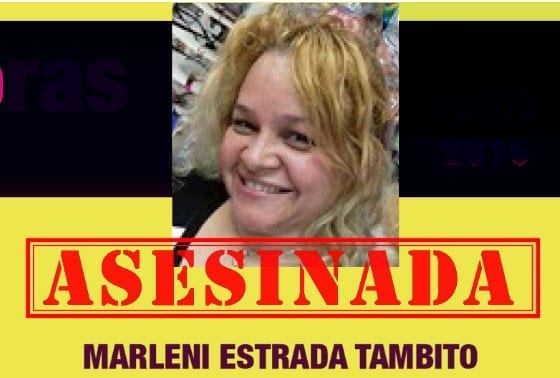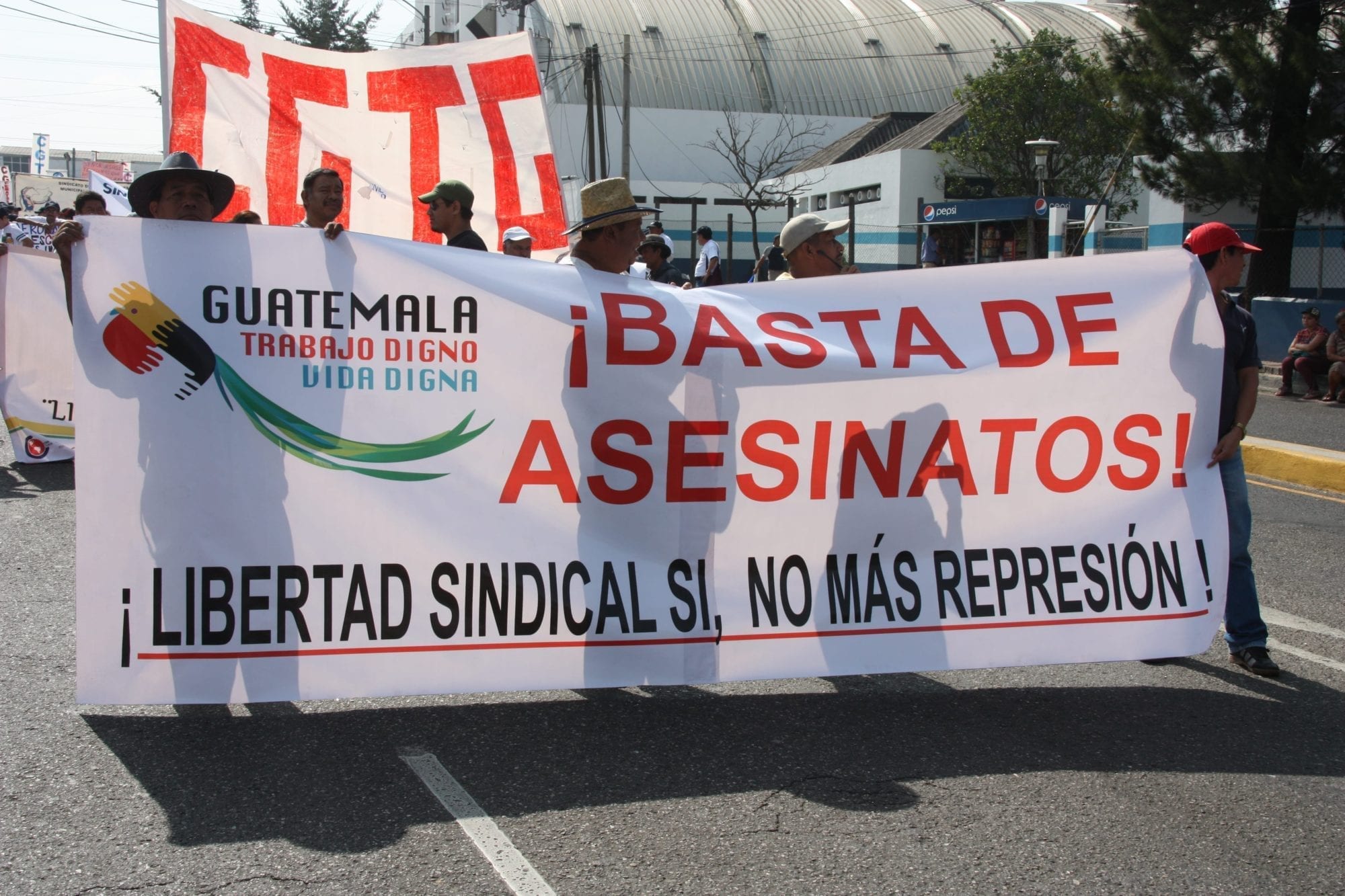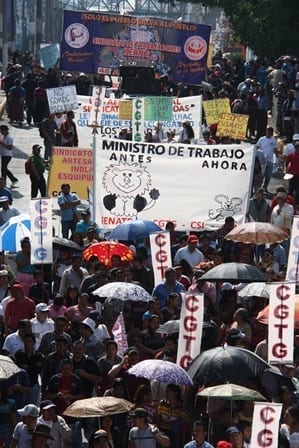
Jun 23, 2016
The murder of Brenda Marleni Estrada Tambito, deputy coordinator of the Legal Advisory Committee of the Trade Union of Workers of Guatemala (UNSITRAGUA / HISTORICA), was a “cowardly criminal attack” according to the Trade Union Confederation of the Americas (TUCA) union leaders, who strongly condemned her murder in a letter to Guatemala President Jimmy Morales Cabrera.
Estrada Tambito was shot five times and killed in Guatemala City June 19. She was followed from a bus terminal after dropping off her father, UNISTRAGUA leader Jorge Estrada y Estrada, who has been advising the negotiation of collective agreements in some of the banana plantations in the Department of Izabal. Several banana union leaders in Izabal have been murdered in Guatemala in recent years, and in 2014, 11 leaders from the UNSITRAGUA-affiliated banana workers’ union were fired on while at the plantation.
“This cowardly murder has again pushed families and the labor movement into mourning and reflects the climate and culture of fear of persecution and violent silencing that lingers in Guatemala and is suffered by workers, leaders and union officials,” TUCA (the Trade Union Confederation of the Americas) and its parent organization, the International Trade Union Confederation (ITUC), wrote.
“This situation is intolerable.”
Union activists are frequent targets for violence and harassment in Guatemala. In the first quarter of 2016, one union member was murdered, another physically attacked and 12 instances occurred in which union activists were threatened or harassed, according to the Red de Defensores de Derechos Laborales (Labor Rights Defenders Network) in Guatemala.
Last year, the Network, a coalition of trade union confederations and human rights monitors, documented 14 incidents of anti-union violence in Guatemala, including the October 2015 murder of Mynor Rolando Ramos Castillo, a municipal worker in southeastern Guatemala.
62 Unionists Murdered in Guatemala in Eight Years
Some 62 union members and leaders in Guatemala have been murdered since the U.S. government pursued an April 2008 complaint against Guatemala for violating the labor chapter of the U.S.-Central American Free Trade Agreement (CAFTA). The government acted after six Guatemalan unions and the AFL-CIO submitted a complaint with the Office of Trade and Labor Affairs (OTLA).
In an unprecedented move, the U.S. government last year agreed to take Guatemala to international arbitration for violating worker rights under CAFTA. The action was the first time that a country has sought international arbitration against another for a violation of labor standards and followed Guatemala’s failure to implement an 18-point enforcement plan to address worker rights violations. More than eight years since filing the complaint, labor rights violations and attacks continue, as the arbitration panel has announced another delay.
TUCA and the ITUC are urging the government to take steps to ensure the safety of trade unionists and to investigate and punish those responsible for Estrada Tambito’s murder. Despite ongoing violence against union members—murder, torture, kidnappings, break-ins and death threats—few perpetrators are brought to justice.

Oct 1, 2015
Mynor Rolando Ramos Castillo, a municipal worker in Jalapa, a city in southeast Guatemala, was shot and killed in front of his home over the weekend. His family detained the killer and turned him into the police. The killer confessed to accepting the hit for 1,500 quetzales (roughly $195).
Ramos Castillo was a union activist with the Sindicato de Trabajadores de la Municipalidad de Jalapa (SITRAMJ), the city workers’ union, and was among 183 workers disputing illegal termination who had won a labor court’s order of reinstatement. Ramos Castillo had been laid off, reinstated to his job and laid off again within the past two years, and was waiting for the city’s mayor to comply with the order to reinstate the workers and pay them back wages. Union leaders say Ramos Castillo and other laid-off city workers were targeted and harassed by city officials because they were active union members. He is the sixth member of his union to be assassinated.
70 Union Members Killed Since 2007
Ramos Castillo is the first union activist murdered this year in Guatemala, where some 70 worker activists have been killed since 2007. Last year, transport union leader Luis Arnoldo Lόpez Esteban was murdered in Jutiapa in May. Marlon Dagoberto Vásqez Lόpez, 19, a member of the young trade unionists’ network and the construction workers’ union, a Solidarity Center ally, was murdered in January 2014.
This year, Guatemalans waged months of public demonstrations, turning out in nearly unprecedented numbers to demand transparency, democracy, accountability and access to justice. As a result, in September, President Otto Perez Molina was forced to step down and arrested, and more than 15 high-ranking government officials have been implicated in a widening corruption scandal. At local government levels, municipal workers say pervasive corruption results in routine wage theft, harassment of workers organizing to improve their workplaces and illegal terminations and reprisals.
Despite ongoing violence against union members—murder, torture, kidnappings, break-ins and death threats—few perpetrators are brought to justice. In an unprecedented move, the U.S. government last year agreed to take Guatemala to international arbitration for violating worker rights under the U.S.-Central American Free Trade Agreement (CAFTA).
The action was the first time that a country has sought international arbitration against another for a violation of labor standards and followed Guatemala’s failure to implement an 18-point enforcement plan to address worker rights violations. The case first arose in 2008, when six Guatemalan unions and the AFL-CIO filed a complaint with the U.S. Office of Trade.
Guatemala, Honduras Not Complying with Trade Provisions
Similarly in Honduras, where this year one union leader was murdered, another forcibly disappeared and presumed dead, and several others threatened and harassed, union activists say their government is not complying with CAFTA provisions. In March 2012, the AFL-CIO and 26 Honduran unions and civil society organizations filed a complaint under CAFTA’s labor chapter, which the U.S. Department of Labor’s Office of Trade and Labor Affairs accepted in 2014. In a February 2015 report, the U.S. Trade and Labor Affairs office said Honduras has made virtually no progress since then.
In denouncing Ramos Castillo’s murder, the Confederaciόn de Unidad Sindical de Guatemala (CUSG) said it would submit the case to the International Labor Organization (ILO)’s Administrative Tribunal. The tribunal is meeting in November to discuss charges that Guatemala is not complying with ILO standards the country ratified, including Convention 87, the Freedom of Association and Protection of the Right to Organize.
The CUSG also echoed the International Trade Union Confederation call for creation of an ILO Commission of Inquiry to “help to open up needed space for debate and consultation” because “the government has no effective preventative mechanisms in place to protect workers from acts of violence or to credibly and effectively investigate and prosecute those responsible.” The ILO sets up an Inquiry Commission when a member state is accused of committing persistent and serious violations and repeatedly has refused to address them.
Aug 1, 2014

Thousands of Guatemalans turned out on May Day this year to protest violence against union members and demand worker rights. Credit: Stephen Wishart
Guatemalan trade union leaders met with U.S. Trade Representative Michael Froman in Guatemala City today to express their frustration with the failure of the Guatemalan government to make any meaningful progress in protecting worker rights.
The meeting took place as Guatemala neared the deadline for complying with a “Labor Action Plan” it signed with the United States in April 2013. The United States granted Guatemala a four-month extension earlier this year. Guatemalan unions and the AFL-CIO first raised concerns about egregious labor rights violations in Guatemala in a joint complaint filed in 2008 under the Central American Free Trade Agreement (CAFTA).
The union leaders told Froman that the government has failed to improve worker rights since the complaint was filed six years ago and in fact, the situation for workers in Guatemala has deteriorated in recent years.
Seventy-two unionists have been murdered in Guatemala since CAFTA was implemented.
“One of the main challenges in achieving labor justice in Guatemala are the high levels of impunity and lack of accountability of those public officials responsible for ensuring respect for labor rights,” said Victoriano Zacarias, deputy general secretary of the Confederacion Central de Trabajadores de Guatemala (Central Confederation of Guatemalan Workers, CGTG).
“Moreover, the bills before Congress on labor issues in Guatemala, if approved, will result only in more labor rights violations and further facilitate greater migration to the U.S. for lack of basic conditions of labor rights.” Zacarias was among union leaders taking part in today’s meeting.
Another participant in the meeting, Carlos Mancilla, general secretary of theConfederacion Unitaria Sindical de Guatemala (United Trade Union Confederation of Guatemala, CUSG), said “the government of Guatemala has no political will to solve the existing labor problems.”
“The government of Guatemala has stated it has made advances, but the only progress has been creating roundtable discussions that have not provided solutions to labor problems, and the establishment of agreements and protocols that are not implemented.”
“This year, the International Trade Union Confederation (ITUC) named Guatemala the most dangerous place in the world to be a union leader,” said Solidarity Center Country Program Director Stephen Wishart, who attended the meeting. “So we’re pleased to see that Ambassador Froman is taking the issue of worker rights seriously and meeting with the unions to hear their side.”
Wishart said that Guatemalan unions will continue to press their government to live up to its labor rights commitments, and added, “The Solidarity Center will stand with our union partners in Guatemala as they keep up their fight for worker rights, safety and decent jobs for Guatemalan workers.”
Feb 3, 2014

Honduran union leader Victor Crespo is among Central American unionists threatened with death. Credit: IUF
The murder last week of Victor Manuel Crespo Puerto, father of Honduran union leader Victor Crespo, is the latest in a deadly turn for trade unionists in Central America. Already this year, two unionists have received death threats in Honduras, one unionist has been murdered in El Salvador and, in Guatemala, one unionist has been murdered and 11 others fired upon.
Since 2009, the year of the presidential coup in Honduras, 31 trade unionists, 57 rural workers and 28 journalists have been murdered there. This anti-union violence is part of climate of violence that gives Honduras the distinction of being the nation with the world’s highest per capital murder rate. Not coincidentally, Honduras also has the highest income inequality in Latin America.
Guatemala, where 65 trade unionists have been assassinated since 2009, now has surpassed Colombia as the most deadly nation in the world for union members. Most recently, Marlon Dagoberto Vásqez Lόpez, 19, a member of the construction worker union was murdered in January. Also last month, gunfire was sprayed on 11 members of the banana worker union as they held a meeting. The National Police never came to the crime scene and no one has been jailed for any such murders in recent years.
The murders and death threats are the culmination of “widespread violations” of workers’ most basic rights, said Stephen Benedict, director of the Human and Trade Union Rights department at the International Trade Union Confederation (ITUC). Workers “daily contend with harassment, interventions from employers and government officials in union matters and ultimately death threats and assassinations.”
Crespo, leader of the port workers union Sindicato Gremial de Trabajadores del Muelle (SGTM), was threatened with death and in September, his home was attacked by armed men yelling that he should “stop making noise organizing stevedores.” He left the country soon after. His father and other family members were targeted this week by an armed assailant who ran them down.
Crespo’s colleagues in SGTM leadership are now receiving death threats. The International Transport Workers’ Federation (ITF) and SGTM believe they are connected to the union’s lawful request for a collective bargaining agreement at the port and workers’ request to receive their legally-required benefits. Despite meetings between the ITF and Honduran security and government officials, the government has taken no serious action to increase security nor act on SGTM’s requests for a collective bargaining agreement.
Other incidents in Honduras since January 1 include:
- Increasingly frequent and specific death threats against José Maria Martinez of the FESTAGRO banana and agricultural worker federation. Martínez, host of a daily trade union radio show for the past 20 years, worked closely with workers at the Tres Hermanas banana plantations as they pushed to win a collective bargaining agreement in the face of harsh employer repression.
- Intimidation and a death threat directed at Nolvia Aracely Paz Rivera, a member of the construction workers’ union SIGTRACOH and community leader in Cofradia. Hooded gunmen have circled her home where she lives with her three children. SIGTRACOH, a Solidarity Center ally, has been active in the community, meeting with workers interested in community development as well as broader engagement to restore democracy in the country. Members of the union have faced harassment, threats and violence.
Last November, Serafin Alas, another SIGTRACOH member in Cofradia, was murdered. Jacinto Cortez, an informal construction worker from the community, was killed earlier last year. Union leaders say nearby police have delayed their responses from 20 minutes to two hours after they receive calls for help.
The Solidarity Center joins Honduran and Guatemalan labor federations and the Trade Union Confederation of the Americas (TUCA-CSA) in demanding prompt investigations of these attacks against union members, and has urged the governments of both countries to find the perpetrators and define a policy and actions to guarantee the life and physical integrity of union members and freedom of association.
Jan 17, 2014

A Guatemalan banana worker.
Earlier this month, on January 5, Guatemala’s first homicide of the new year took the life of 19-year-old Marlon Dagoberto Vásquez López, an active youth leader and member of the construction workers’ union, Sindicato Nacional de Trabajadores de la Construcción y Servicios de Guatemala (SINCS-G). His murder brought to 65 the toll of trade unionists assassinated in the country since 2007. Most of their murders have gone unsolved, making Guatemala the most deadly place to be a union member, after Colombia.
The Solidarity Center works with SINCS-G and other Central American unions.
Last Friday, 11 members of the banana worker union, Sindicato de Trabajadores de la Empresa Agropecuaria Omagua, S.A. Campo Verde I y II, held a meeting at their headquarters in Izabal, Guatemala. As they held their meeting, an unknown vehicle approached from the highway fronting the Honduran border and unleashed gunfire upon the plantation workers, shooting Juan DeDios Sagastume Rodas, secretary general for the union. Despite being immediately informed of the attack, the National Police never appeared at the crime scene and waited until the following day to interview the victim at the hospital.
Over the past three years, seven banana union leaders have been murdered in Guatemala. The country has recently committed to a Labor Enforcement Plan as it attempts to avoid arbitration for violating the labor chapter of the CAFTA-DR free-trade agreement. The U.S. government filed the labor complaint in April 2008 based on evidence provided by six Guatemalan unions and the AFL-CIO. The Guatemalan government also committed to the Workers’ Group of the International Labor Organization “to ensure the safety of workers, with effective measures to protect union members and leaders, and their property, from violence and threats.”
The astounding violence of the first weeks of 2014 against trade unionists in Guatemala must end. The American labor movement joins Guatemalan union federation UNISTRAGUA and the Trade Union Confederation of the Americas (TUCA-CSA) to demand President Otto Pérez Molina ensure prompt investigations of these attacks against union members, find the perpetrators and define a policy and actions to guarantee the life and physical integrity of union members and freedom of association





